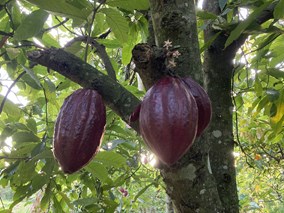Relieving the cocoa crisis with empty cocoa pods
Climate change is the biggest challenge for the KAPATCHIVA cocoa farmers in Côte d’Ivoire. Cocoa pod biochar from BIO4Africa could be part of the solution.
Persistent drought is compromising the cocoa harvest in Côte d’Ivoire. At the KAPATCHIVA cocoa cooperative, it’s the reason why the BIO4Africa project and its pilot production of biochar is of immediate interest. Biochar made from empty cocoa pods has the potential to improve and retain moisture in the soil.
Located a 90-minute drive west of the capital Yamoussoukro, KAPATCHIVA is participating in the BIO4Africa business development programme. Soil amendment by biochar came up as a sustainable opportunity during the training. Today, the cooperative is committed to ending the use of chemical fertilisers and pesticides, encouraging all its 3,000 farmer members to make the move to organic production.
“Because the soil is frequently dried by drought, it’s difficult for our producers to get great yields. The use of chemicals has killed the soil’s ‘friends’. With the use of bioproducts, we can bring the soil back to life and support plant growth,” says Jean Kouassi Kouassi, president of the cooperative’s survey council.

From waste to biochar
Biochar made from empty cocoa pods and other agricultural waste is currently being piloted in a specially built pyrolysis kiln at Institut National Polytechnique Félix HOUPHOUËT-BOIGNY (INP-HB) in Yamoussoukro.
The pilot is part of the BIO4Africa research and innovation project. Driven by 25 partners in Africa and Europe, BIO4Africa is engaging African farmers in trials of small-scale bio-based technologies that can help them become more climate resilient and improve their social and economic performance. Soil amendment with biochar shows particular promise.
Fairtrade supplier
The cocoa cooperative is on a similar mission to develop agricultural, environmental and social best practices. As a member of the ECOOKIM union of rural primary cooperatives, KAPATCHIVA became Fairtrade certified in 2010. Part of the income from Fairtrade sales is invested in new schools, hospitals, drinking water pumps and other community projects.
In 2012, KAPATCHIVA began selling cocoa to the ethical confectionery company Tony’s Chocolonely, which was founded on a vision to make chocolate production 100% slave free. This collaboration has increased the focus on eliminating child labour on the cocoa plantations, explains Agniful Didier Amichia, KAPATCHIVA’s head of sustainability.
“Tony’s provides financial support and training to fight child labour on the plantations. Today, we have 18 community liaisons who work with the farmers to raise awareness of child labour and encourage children to go to school.”
A living wage
On the plantations, Tony’s Chocolonely supports the planting of shade trees, which protect the cocoa trees from the sun to improve yield and restore biodiversity.
Kouassi Kouassi expects fertilisation with cocoa pod biochar will add to the positive impact – on farmer incomes as well as the soil.
“What we want is that every farmer can earn a living wage,” he says. “It’s about having enough income to pay for food, health and education and to invest in renewing the plantations.”